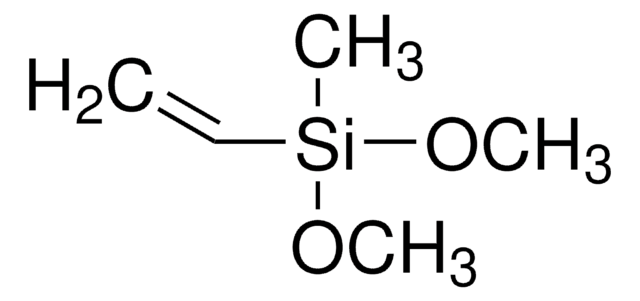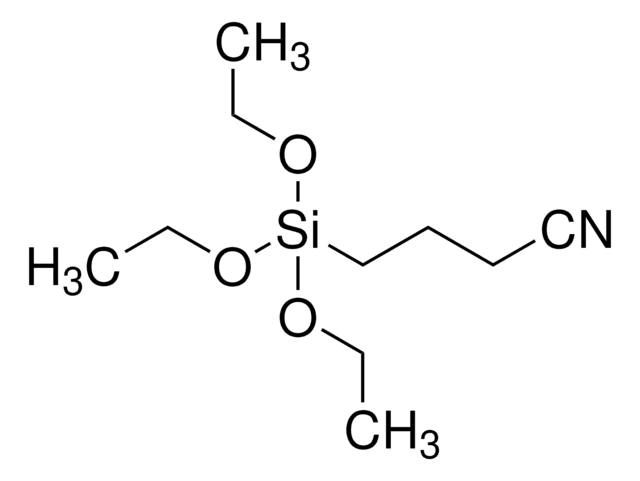539252
3-Glycidoxypropyldimethoxymethylsilane
97%
Sinonimo/i:
(3-Glycidoxypropyl)methyldimethoxysilane
Autenticatiper visualizzare i prezzi riservati alla tua organizzazione & contrattuali
About This Item
Formula empirica (notazione di Hill):
C9H20O4Si
Numero CAS:
Peso molecolare:
220.34
Numero CE:
Numero MDL:
Codice UNSPSC:
12352103
ID PubChem:
NACRES:
NA.23
Prodotti consigliati
Saggio
97%
Stato
liquid
Indice di rifrazione
n20/D 1.432 (lit.)
P. ebollizione
100 °C/4 mmHg (lit.)
Densità
1.02 g/mL at 25 °C (lit.)
Stringa SMILE
CO[Si](C)(CCCOCC1CO1)OC
InChI
1S/C9H20O4Si/c1-10-14(3,11-2)6-4-5-12-7-9-8-13-9/h9H,4-8H2,1-3H3
WHGNXNCOTZPEEK-UHFFFAOYSA-N
Descrizione generale
3-Glycidoxypropyldimethoxymethylsilane (GDMMS) is an epoxy-silane that is used to form a silane based coupling agent for functionalization of a variety of substrates. The epoxy groups allow good adhesion of surface atoms and form a stable polymeric structure.
Applicazioni
3-Glycidoxypropyldimethoxymethylsilane (GDMMS) precursor was used to develop zwitterionic push – pull chromophore and carbazole-derivatives-doped hybrid organic–inorganic homogeneous films.{71}
GDMMS can surface modify indium tin oxide (ITO) glass substrate for the immobilization of surface atoms which can be further used for the electrochemical detection and labeling. It can also be used as a hardener in the formation of multi-component silicone based rubber.
The usual cure time is 16-20 hours at room temperature or 1 hour at 100C.
Codice della classe di stoccaggio
10 - Combustible liquids
Classe di pericolosità dell'acqua (WGK)
WGK 3
Punto d’infiammabilità (°F)
221.0 °F - closed cup
Punto d’infiammabilità (°C)
105 °C - closed cup
Dispositivi di protezione individuale
Eyeshields, Gloves, multi-purpose combination respirator cartridge (US)
Scegli una delle versioni più recenti:
Possiedi già questo prodotto?
I documenti relativi ai prodotti acquistati recentemente sono disponibili nell’Archivio dei documenti.
I clienti hanno visto anche
Headgroup effect on silane structures at buried polymer/silane and polymer/polymer interfaces and their relations to adhesion.
Zhang C, et al.
Langmuir, 28(14), 6052-6059 (2012)
Surface functionalization using catalyst-free azide- alkyne cycloaddition.
Kuzmin A, et al.
Bioconjugate Chemistry, 21(11), 2076-2085 (2010)
Label-free ITO-based immunosensor for the detection of very low concentrations of pathogenic bacteria.
dos Santos MB, et al.
Bioelectrochemistry, 101(11), 146-152 (2015)
Francesca Volpetti et al.
ACS synthetic biology, 6(11), 1979-1987 (2017-08-05)
Synthetically engineered cells are powerful and potentially useful biosensors, but it remains problematic to deploy such systems due to practical difficulties and biosafety concerns. To overcome these hurdles, we developed a microfluidic device that serves as an interface between an
Electro-optics poled sol?gel materials doped with heterocycle push?pull chromophores.
Della Giustina G, et al.
Materials Science & Engineering. C, Materials For Biological Applications, 26(5), 979-982 (2006)
Il team dei nostri ricercatori vanta grande esperienza in tutte le aree della ricerca quali Life Science, scienza dei materiali, sintesi chimica, cromatografia, discipline analitiche, ecc..
Contatta l'Assistenza Tecnica.












